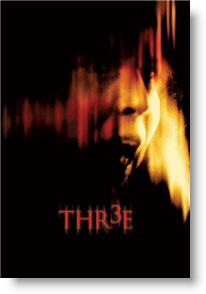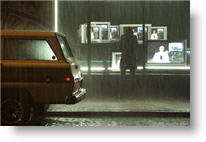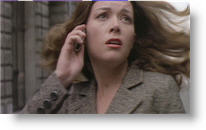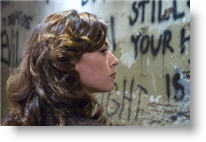Thr3e
 for violence, disturbing images and terror.
for violence, disturbing images and terror.
Reviewed by: Michael Karounos
CONTRIBUTOR
| Moral Rating: | Average |
| Moviemaking Quality: |
|
| Primary Audience: | Adults Teens |
| Genre: | Thriller |
| Length: | 1 hr. 45 min. |
| Year of Release: | 2007 |
| USA Release: |
January 5, 2007 (wide) DVD: April 24, 2007 |
| Featuring |
|---|
| Marc Blucas, Justine Waddell, Sherman Augustus, Laura Jordan, Max Ryan, Bill Moseley, Jeff Hollis, Josh Skjold, Priscilla Barnes, T.G. Boleyn, Bruno Jasienski, Jack Ryan |
| Director |
|
Alan B. McElroy |
| Producer |
|
Namesake Entertainment “House” |
| Distributor |
The movie “Thr3e” is based on the bestseller of the same name by Ted Dekker. It is a thriller marketed as a horror movie and it is getting terrible reviews from all the secular outlets. I will explain what I think is the reason for those poor reviews later in this review.
The basic plot of “Thr3e” involves Kevin Parson, a seminary student (Marc Blucas); Jennifer Peters, a police psychologist (Justine Waddell); and Samantha Shears, his childhood friend (Laura Jordan). Parson is both hunted and haunted by a voice from his past as Peters tries to solve two series of crimes which may or may not have two separate criminals.
“Thr3e” opens in a seminary classroom in which the discussion introduces the theme of the movie: man’s life-long struggle against evil. If I remember correctly, Professor Francis asks “Who said ‘Evil is the blemish of our species that will not spare any man.’” A student incorrectly answers “Freud” and the professor rejoins with a smile “Freud is not my favorite moral philosopher.” The correct answer is Kant, and it leads to subsequent discussions of being evil, doing evil, and struggling with evil.
That answer also frames the existential tension in the movie. The evil in the movie is clearly physical because a psychopath uses bombs to kill his victims. But the evil is also psychological as evidenced by the use of a psychologist and the clever plot twist. Finally, the evil is spiritual. One of the clues the stalker leaves is a direct quotation from Romans 6:23. In varying degrees, the movie references a police detective, a psychologist, and a priest to solve the riddle of the crimes.
“Thr3e” cannot be properly understood without observing these three aspects of the plot. The title of Kevin Parson’s dissertation, The Nature of Evil, is another clue for the viewer as to the theme of the movie. These are essential ingredients to the film and seem to be universally ignored by critics who are either looking for horror only or don’t know how to find a movie’s theme.
A further hint is offered in the statement by Professor Francis: “There are three natures: the good, the bad, and the poor soul struggling between them.” In other words, it isn’t just the serial killer that is the subject of “Thr3e;” it is evil as it manifests itself in the life of good, bad, and struggling individuals. Some succumb to evil entirely (the Riddle Killer); some seek to overcome evil (the psychologist); and some struggle with evil (Kevin Parson).
The movie progresses from incident to incident using the mechanism of the stalker’s phone calls to drive the action. Unfortunately, the tone and direction fail to convey the intelligence of the story line. In this regard, the film is similar to “The Da Vinci Code,” which, in spite of its multiple themes and frantic pacing, produced an emotionally flat movie. It also reminds me of “Godsend” which was likewise a good idea with flawed execution. Perhaps if director Robby Henson had Ron Howard’s budget for the “The Da Vinci Code,” he would have made a much better movie, but we’ll never know.
One can criticize many aspects of the movie. It is too claustrophobic, giving it a made-for-TV feel; it is under populated, which continually reminds viewers that they’re on a set; the acting alternates between flat and shrill, which undermines the credibility of the characters; and, for my taste, it relies too much on the conventional horror gimmicks of jump sounds, jump images, and nervous camera work.
Unfortunately, the director made a stylistic choice of emulating the look of “Saw.” This was a regrettable commercial decision. I think the subject matter would have been better served by turning it into a noir suspense drama which would focus more on characters and themes and less on special effects and the manipulation of viewers’ emotions.
Having said that, I would like to address what I consider the critics’ bias against the movie because of its Christian theme.
In keeping with the theme of three, it is appropriate to quote Goethe who once said that there are three kinds of readers: the one who enjoys without judging, the one who judges without enjoying, and the one who reading and judging enjoys both. Clearly, it is best to be in the latter category.
This is why Christians are directed to take every thought captive (2 Cor. 10:5) and it is both foolish and even sinful to see movies like, for example, “Borat…,” for the mere pleasure of self-enjoyment. That type of viewer falls into the first category of reader/viewer which one may classify as childish or ignorant but not as innocent.
No adult Christian should be so foolish as to indiscriminately consume media without reflection. Such a person would not eat food indiscriminately, and movies “rich” in comedic folly are far worse for the spiritual person than are rich foods. We are not living in an innocent world and cannot claim an “innocent” pursuit of pleasure in defense of our actions.
The second type of reader Goethe identifies reminds me of the critics that one may peruse at Rotten Tomatoes. Some object to the aesthetics, some object to the story, and others object to the Christian ideology. All have valid points. My objection is that they don’t apply the same standards to secular films. They judge without enjoying because their politics get in the way.
For instance, a grossly political movie like “The Children of Men” gets an over 90% rating. The reason the critics like this movie so much is because they agree with its propagandistic aim which the director, Alfonso Cuaron, in the special “Children of Men: Visions of Men,” admits is about “ideology.” The movie cites “Homeland Security,” anti-immigration policies, and portrays a society oppressed by a fascist, racist police state. Sound familiar? The same territory was covered by “V for Vendetta” last year and both are obviously attacking the United States from a Leftist perspective.
Such reviews and such reviewers are deeply dishonest and are practicing what is called in literary and film studies “reception theory”:
“It is likely that the less shared heritage a reader has with the artist, the less she will be able to recognize the artist’s intended meaning, and it follows that if two readers have vastly different cultural and personal experiences, their reading of a text will vary greatly.” https://en.wikipedia.org/wiki/Reception_theory
In other words, the critics are showing their ideological affiliation by judging movies based on their own “cultural experiences.” They prove themselves to be dishonest viewers who approve or disapprove of a movie based upon ideology but express in their writing a supposed objective standard of judgment. The critics of “Thr3e” who object because it is “aimed at a Christian audience” or because it is “for that good Christian family who’s aching to see a neutered, unoriginal crime thriller” are clearly offended by its Christian content. That is a perfectly valid reason, but they should be professional enough to treat it as another element of the movie or to say that the ideology is their major complaint.
When I review a movie that I object to on Christian grounds I state so specifically. That is, I don’t hide my ideology behind a dishonest attempt at objectivity. The very purpose of a Christian Web site is to provide a Christian perspective. As such, it is openly ideological. But secular media outlets, by definition, are also ideological and Christians should not be naïve about recognizing the fact. Secular critics objected to “The Passion…” because it was Christian, not because it had too much blood and violence.
It would be refreshingly honest and even commendable in such a fractious time as ours if a critic would simply say “It is a bad horror film, and I don’t like Christian movies” and could do so dispassionately.
Lastly, there is the type of person who enjoys both viewing and judging. Christians are repeatedly called upon to enjoy the things of the world as well as to discriminate in their usage (Romans 14:1-3). In that regard, one may judge “Thr3e” on both the grounds of taste and judgment. As to taste, if you like the look and feel of horror films, then you may like “Thr3e.” As to judgment, if you like a movie that deals with profound issues such as good and evil, then you may likewise like “Thr3e.” Like “Godsend,” “Thr3e” is a drama dealing with issues of faith and morality that went astray by trying to appeal to the horror market.
Nonetheless, the central question of the movie is one that is relevant to everyone because in each of us is a soul that is engaged in a life-long struggle between good and evil (Romans 7:14-21). I recommend this movie in spite of its cinematic flaws, because that is the crucible that Kevin Parson finds himself in and which secular reviewers, too, caught up with formal criticisms, are unable to see.
Violence: Moderate / Profanity: None / Sex/Nudity: None
See list of Relevant Issues—questions-and-answers.


Does the movie have million dollar special effects? No.
Does the movie have the greatest acting? No.
What it does have going for it is a great story.
It is a movie that is suspenseful and has an ending that is hard to see coming. It is also a movie that leaves you with many philosophical issues to discuss. The movie deals with the exsistence of Evil and its presence inside mankind. The movie deals with the fact that many of us have something in our past we are either running from or want to keep hidden from others. The movie does not necessarily answer all of these issues in a clear Christian way, but it opens the doors for some very important discussions.
Excellent! / 4
I want to warn people against reading too many negative comments before viewing the film. The following contains some spoilers, not just for the plot, but for the pure enjoyment of watching a film without preconceived notions. It was directed by Robby Henson (“The Visitation”) and produced by Ralph Winter (“X-Men”). The latter really excited me. One of my disappointments is the lack of African-Americans for the inner-city setting, I counted five or six. There were a few other things that were out of place. A man was standing ten feet in front of the bus looking at it before it blew up, knowing that every one else was running for their lives. Then people were running around, like they didn’t know what they were doing. This also happened twice at the police station. Evidently they did not have a bomb unit or any way to isolate a bomb blast (hard to believe since they deal with bombers). Officer Peters flippantly throws the bomb out of an upper story window, endangering all of the people that were evacuated for safety. Another problem, if my memory serves me correctly, I think that she was down stars in the basement originally. Undercover plain clothed cops are specifically dispatched and we see uniformed officers running frantically to the destination.
While investigating the scene of an old crime between two youths, two police officers wore what looked like some kind of chemical suits. Another time we see cops in full riot gear arresting what appeared to be an unsuspecting unarmed man while he was at work. I think Justine Waddell did great as Officer Jennifer Peters, but there were times when she didn’t seem to fit an officer of her supposed stature, obvious directing issues. Besides the bomb, twice she is seen running around with her gun in hand, more for camera action than for realism. The personality of a strong calculating cop was also absent at the end as she quickly warms up to Kevin Parson, without really giving their relationship the time needed to get to that point. It seemed a bit unnatural in comparison with the book having ended with more of a pre warm up. There were obvious feelings, but they seemed guarded.
Overall, I think the acting was superb. Laura Jordan portrayed Samantha beautifully. The directing, perhaps being stifled by a low budget could have been better, but nevertheless had a lot going for it. The special effects were not perfect, but got the point across. The filmography was great. Some of the sets were better than others. Slater’s hide out looked more like a cheap haunted house. Some critics blasted the movie and you may think that I am too, but in spite of its problems I thoroughly enjoyed it and I hope you do too. It has some disturbing images and a mature plot. Not recommended for a fifth grade Sunday school class. Recommended for older teens and adults. Good conversation opener on the nature of good and evil. One of the theme verses is Romans 6:23, The wages of sin is death. No cussing, no sex, no cheap talk, no sexually suggestive clothing
Good / 3½
By no means is it as rough as “24” or any of the “CSI”'s but it didn’t sugar coat the book which I really appreciated. I have been so tired of looking forward to my favorite books being done into movies, (aka “Left Behind” I,II,III) and then being so disappointed that I spent so much energy looking forward to them, only to see a shell of what I loved in the books be brought out. I think if you want any interesting thriller, without the sex and foul language go see Thr3e, it is one of those that we shouldn’t be scared of just because it is a movie that may not meet our criteria of what we think a Christian movie should be. If Thr3e gets one person thinking about the nature of absolutes, good and evil, I think the film makers have done a worthy job.
Better than Average / 4
Average / 4
Good / 4½
Average / 2
Average / 3
Average / 3
Moral rating: Average / Moviemaking quality: 2½
Good / 1
Better than Average / 1½
Average / 1
Good / 1
Average / 3
Good / 1½
Very Offensive / 1½
Good / 4
Good / 4½
Good / 3
I was slightly disappointed with a few things, though. Dr. Francis has a very large role in the book, but he’s only in this movie about 5 minutes tops. He even helps Jennifer figure out the surprise ending and goes with her. The library bomb was never seen, and Sam was actually with the CBI in the book, not an insurance investigator, and was doing her own police work on the side.
But I will address some of the surprise ending that might have confused some people.
**MAJOR SPOILER WARNING! Turn back now so you don’t find out the twist!! If you keep reading and haven’t read the book or seen the movie, you’ve been warned!**
In the book, the split personality is handled a little better. Sam realizes that she can’t remember a lot of the facts about her life, and realizes Kevin fabricated them. It also explains why she is “at Kevin’s house” while he is in the basement with Slater. None of that was really happening, Kevin was fabricating it. He was merely calling Jennifer speaking in a higher octave while he was in the basement of the garden shed. Same with when Kevin is asleep, he was thinking he was asleep, but really wasn’t. That’s how he was Slater, too. In the book, he keeps saying how he’s tired and feels like he hasn’t slept in days, because he really hasn’t. He’s been three people at the same time for hours. In the book, Jennifer says she’s talked with Sam many times, but Dr. Francis says that when he talked with her, her voice wasn’t so high it was necessarily female. A few more things happen in the book that really explain it better, because we get into the characters thoughts and the conversation between Dr. Francis and Jennifer is longer at the end, but for those, you have to read the book. But that’s OK, because it was still handled pretty well.
**SPOILER ENDED**
I also think that God was very obvious in this movie. Sure, there wasn’t a huge altar call at the end, but it’s really supposed to be a parable. It’s something a non-believer can look at and open up their Bible for the first time and find out what God says about good and evil. All in all, while it wasn’t amazing, it was a very good movie and the book to script adaptation was done very well.
Excellent! / 4
Better than Average / 4
The movie fails to explain a whole lot, and really doesn’t build any suspense. Bill Moseley plays an awesome Slater, though the character in the book was a whole lot better.
It would be unfair to base all my judgment on straying from the book, because in most cases the books are better than the movies. As a Christian, I recognized the messages, though they were hard to distinguish at times. The acting was poor, except for Kevin (played amazingly by Marc Blucas) and Slater (Bill Moseley). The script failed me, too.
Besides the fact that the film isn’t enthralling, or too interesting—based on the spiritual issues, as well as, just the emotion make it worth watching. I even own the movie; I just refrain from watching too often. What I found most profound about this film was the quote recited from St. Augustine, “Evil is beyond the reach… of NO man.” A fact that is unfortunately all too true.
Moral rating: Good / Moviemaking quality: 2













My Ratings: Better than Average / 4